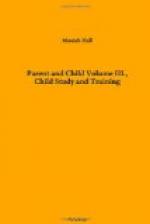“Homes are wrecked because families refuse to take home life in religious terms, in social terms of sacrifice and service. In such homes, organized and conducted to satisfy personal desires rather than to meet social responsibility, these desires become aims rather than agencies and opportunities. What hope is there for useful and happy family life if the newly-wedded youths have both been educated in selfishness, habituated to frivolous pleasures and guided by ideals of success in terms of garish display?
“It is a costly thing to keep a home where honor, the joy of love, and high ideals dwell ever. It costs time, pleasure, and so-called social advantages, as well as money and labor. It must cost thought, study and investigation. It demands and deserves sacrifice; it is too sacred to be cheap. The building of a home is a work that endures to eternity, and that kind of work never was done with ease or without pain and loss and investment of much time. Patient study of the problems of the family is a part of the price which all may pay.
“No nobler social work, no deeper religious work, no higher educational work is done anywhere than that of the men and women, high or humble, who set themselves to the fitting of their children for life’s business, equipping them with principles and habits upon which they may fall back in trying hours and making of home the sweetest, strongest, holiest, happiest place on earth.”
The home or family is, or ought to be, the supreme institution, not only for propagating the race, but also for the preservation and rearing of children.
There are certain things which only the home can do, which if not accomplished by it, will likely remain undone. The acquisition of correct physical habits by the child is one of them. It is preeminently the duty and privilege of the parent in the early years of the child’s life to impress habits that will make for health and strength. The first six years are more important physically to the child than all the remainder of his life. During this time the natural tendency to over-indulgence of the appetite should be inhibited, and temperance should be reduced to a habit. The other desirable physical habits already referred to should also be acquired. Furthermore, it is the sacred duty of the parent to see to it that the child is not handicapped through physical defects of eye or ear, enlarged tonsils, adenoids, decayed teeth, or by any other common imperfection which may be easily and permanently remedied if taken in time, but which, if neglected, may cause untold suffering and contribute to failure in life.
The home is responsible directly for training the child to be neat, tidy and clean in person; it should also train him in good manners, courtesy, and regard for the rights of others. It also decides whether or not the boy shall be a brave, manly little fellow or a timid cry-baby; whether or not the girl shall be sweet, helpful and trustworthy, or shallow, idle and vain.




